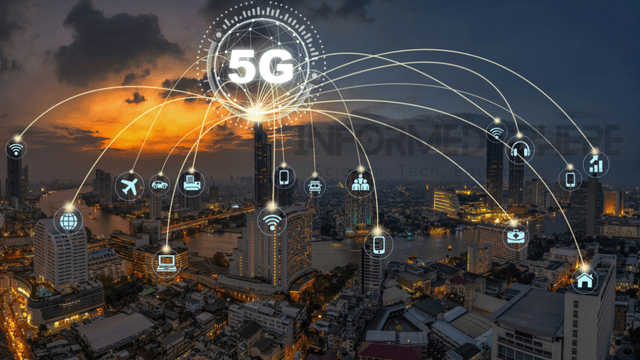[today_date]
The Impact of 5G on Connectivity and Innovation: A Game Changer for the Future

The Impact of 5G on Connectivity and Innovation: A Game Changer for the Future
As the world becomes increasingly connected, the impact of 5G technology marks a significant milestone in the evolution of digital communication. Promising faster speeds, lower latency, and more reliable connections,

What is 5G? Understanding the Next-Generation Network
5G, or fifth-generation wireless technology, is the latest iteration of mobile networks, following 4G LTE. It offers unprecedented speed and bandwidth, capable of delivering data at rates up to 100 times faster than its predecessor. But 5G is more than just speed; it also brings about significant improvements in latency (the time it takes for data to travel from one point to another) and the ability to connect more devices simultaneously.
The Advantages of 5G: Speed, Latency, and Capacity
1. Blazing Fast Speeds
One of the most touted benefits of 5G is its speed. With download speeds that can exceed 10 Gbps, 5G enables quicker access to large files, smoother streaming of high-definition content, and a more responsive internet experience overall. This leap in speed is set to redefine how we use mobile devices, opening up possibilities for more data-intensive applications.
2. Ultra-Low Latency
Latency in 5G networks can be as low as 1 millisecond, compared to around 50 milliseconds in 4G. This near-instantaneous data transfer is critical for applications requiring real-time responsiveness, such as autonomous vehicles, remote surgery, and virtual reality (VR). The reduced lag time will enhance user experiences and enable innovations that were previously impractical.
3. Increased Network Capacity
5G technology can support a massive number of connected devices without compromising performance. This increased capacity is essential for the Internet of Things (IoT), where billions of devices—ranging from smart home gadgets to industrial sensors—are expected to communicate seamlessly. The ability to handle this level of connectivity will drive the development of smart cities, connected factories, and more.
Transformative Impact on Industries
1. Healthcare
In the healthcare sector, 5G is poised to enable groundbreaking advancements. Telemedicine will become more widespread, with high-definition video consultations and remote diagnostics becoming the norm. Additionally, 5G’s low latency will make it possible for surgeons to perform operations remotely using robotic systems, a development that could revolutionize medical care in remote or underserved areas.
2. Transportation
Autonomous vehicles are heavily reliant on real-time data to navigate safely. The ultra-low latency of 5G will allow self-driving cars to communicate with each other and with traffic management systems instantaneously, reducing the risk of accidents and improving traffic flow. Moreover, smart transportation systems powered by 5G will optimize routes, reduce fuel consumption, and minimize travel time.
3. Manufacturing
The manufacturing industry is set to benefit from 5G through the concept of the smart factory. In such environments, machines and sensors will communicate in real time, allowing for predictive maintenance, improved quality control, and more efficient production processes. 5G will enable manufacturers to deploy AI and IoT at scale, leading to greater automation and productivity.
4. Entertainment and Media
The entertainment industry will see a surge in new experiences powered by 5G. Virtual reality (VR) and augmented reality (AR) will become more immersive and accessible, offering users new ways to interact with digital content. Live events, such as concerts and sports, can be streamed in ultra-high definition without lag, providing a superior viewing experience.
5. Agriculture
In agriculture, 5G will facilitate the use of smart farming technologies. Drones equipped with sensors can monitor crop health in real time, while automated irrigation systems can adjust water usage based on real-time data, leading to more efficient and sustainable farming practices.
Challenges and Considerations
While 5G offers numerous benefits, it also presents challenges. The rollout of 5G infrastructure is costly and requires significant investment in new hardware and networks. Additionally, concerns about security, privacy, and the environmental impact of increased energy consumption must be addressed. Collaboration between governments, tech companies, and stakeholders is essential to overcome these challenges and ensure that the benefits of 5G are realized globally.
The Future of 5G: A Catalyst for Innovation
As 5G networks continue to expand, their impact on connectivity and innovation will become increasingly evident. This technology is not just an upgrade but a fundamental shift in how we interact with the digital world. From transforming industries to enabling new experiences, 5G is set to be a catalyst for unprecedented innovation, shaping the future in ways we are only beginning to imagine.
🧑💻Informed Sphere Team





3 Comments
Emma SugarRush called you 2 times. She is online. Click the below link to chat with her. She is very horny now.
https://free-dating.club/
Emma SugarRush called you 2 times. She is online. Click the below link to chat with her. She is very horny now.
https://free-dating.club/
I know this if off topic but I’m looking into starting my own blog and was wondering what all is required to get setup? I’m assuming having a blog like yours would cost a pretty penny? I’m not very internet savvy so I’m not 100 certain. Any tips or advice would be greatly appreciated. Thanks